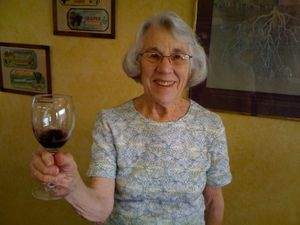By Evan Dawson, Finger Lakes Editor
Libby Prejean has not been back to West Virginia in 60 years, but sometimes she just can't help it. The "I" becomes an "Ah." The edges of her speech get lethargic.
The Marechal Foch we're drinking is not by any means a sweet red wine, but it's not Vitis vinifera, either. And Prejean says that hybrids have helped keep the vinifera operation chugging. "It would still be hard to profit with nothing but vinifera," she says. "It's easier to make it work when you have other things helping."
The Foch is a nice example, as I imagine it's easier to sell to many customers than a bottle of cabernet franc. It's dark in the glass, but it's soft in the mouth, even if it's not deep or complex. "We worked for many years to get this Marechal Foch to a point where you'd want to drink it," Prejean admits. "It wasn't always approachable. We're happy with where it is now."
Unlike many other Finger Lakes operations that have been around for nearly three decades, growth has never been the highest priority for Prejean. They're holding steady at 6,000 cases, and that's enough for Libby Prejean. "We don't need more than that," she says, smiling. "That hasn't changed for us." Her endearing accent reminds me that one of the keys to life is finding out what needs to change and what does not. At Prejean, they think they've got it figured out pretty well.

